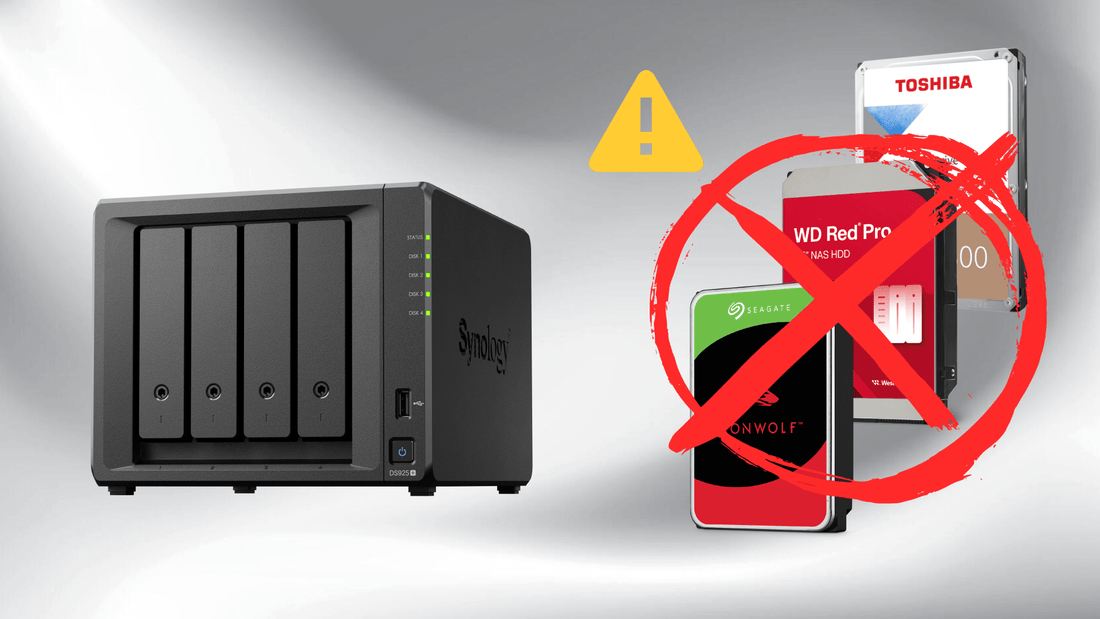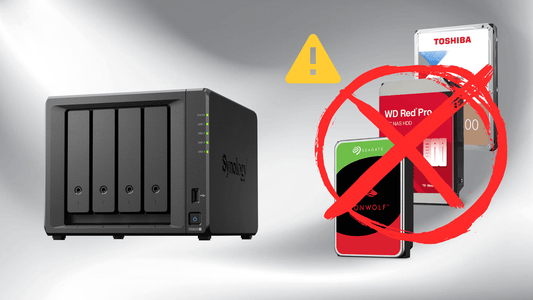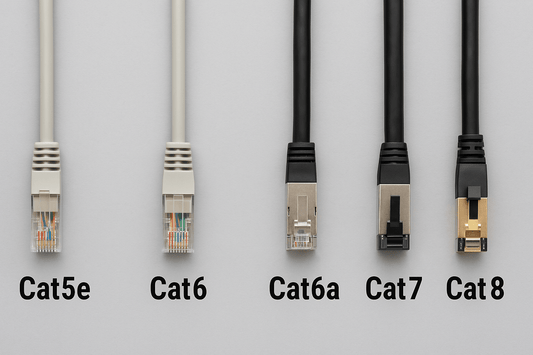Synology Forces Proprietary HDD and SSD in New 2025 NAS Models

Synology Pushes New NAS Models with Proprietary Drives – A Game Changer or Customer Frustration?
Synology has recently introduced its 2025 lineup of DiskStation NAS, including DS225+, DS425+, DS725+, DS925+, DS625slim, DS1525+, DS1825+, DS1825xs+, and RS2825RP+. Alongside these, the new DX525 and RX1225RP Expansion Unit is also available. However, this launch comes with a controversial twist—customers are now compelled to exclusively use Synology-branded drives (HDD, SSD, or NVMe), excluding renowned third-party brands like Seagate, WD, and Toshiba.
Highlights
• Synology launches new 2025 NAS models
• Mandatory use of Synology's proprietary drives
• Concerns and customer complaints about restrictions
• Performance and integration advantages claimed by Synology
• Compatibility warnings when migrating from older drives
What's the Big Deal? Forced Compatibility Explained
With the introduction of models like the DS925+ and DS1525+, Synology has deliberately limited drive compatibility to its proprietary offerings:
• Synology HAT3300 Plus Series 3.5" SATA HDD
• Synology HAT5300 / HAT5310 Enterprise Series 3.5" SATA HDD
• Synology SAT5221 Enterprise Series 2.5" SATA SSD
• Synology SNV3400 / SNV3410 Series M.2 NVMe SSD
These new restrictions extend even to expansion units like the DX525 5-Bay Tower and RX1225RP 12-Bay Rackmount Expansion Unit.
Impact on Existing Users: Migration Warnings and Fear Factor

Customers migrating from older Synology NAS units using third-party drives like Seagate, WD, or Toshiba will encounter alarming warnings:
“Migrated from another system—these drives may affect system reliability and stability and must be replaced immediately.”

This creates unnecessary anxiety among users who trusted their existing NAS configurations. Furthermore, if storage volumes become damaged, users won't have the flexibility to rebuild arrays using trusted third-party drives, even well-known brands, further limiting user options and freedom.
Synology’s Perspective: Why Proprietary Drives?
Synology emphasizes several distinct advantages of using their drives over standard third-party NAS drives, such as WD Red or Seagate IronWolf:
Tighter DSM Integration
• Synology drives are specifically designed and tested with Synology’s DSM operating system.
• Improved I/O handling and optimized RAID management.
• Adaptive RAID parity technology for enhanced performance and reliability.
Proven Performance Gains
According to Synology’s internal benchmarks, using proprietary drives delivers:
• 29% faster sequential read speeds
• 13% faster sequential write speeds
• 27% quicker RAID repair times
Seamless Maintenance
Firmware updates are streamlined directly through DSM with automatic notifications—no external tools or visits to multiple vendor websites required.
Single-Vendor Support
One of the key selling points is simplified troubleshooting and faster issue resolution. Having both hardware and software under a single vendor (Synology) streamlines support.
Customer Complaints: Are Restrictions Worth It?
While Synology makes strong arguments for its proprietary drives, many customers remain skeptical or outright unhappy with these changes. Common concerns include:
• Higher costs associated with Synology-branded drives compared to third-party alternatives.
• Limited flexibility, as consumers traditionally prefer choosing their preferred brands.
• Increased cost of ownership in long-term maintenance, especially when expanding or replacing drives.
Should You Choose Synology Drives or Stay with Third-Party Brands?
| Factor | Synology Drives | Third-Party Drives (WD/Seagate/Toshiba) |
|---|---|---|
| Compatibility | Fully integrated with DSM | Compatibility decreasing in new models |
| Performance | Optimized, superior speeds | Standard NAS performance |
| RAID Rebuild Speed | Faster RAID rebuild times | Standard RAID rebuild times |
| Firmware Maintenance | Integrated into DSM updates | Requires external firmware management |
| Cost | Higher upfront cost | More economical |
| Flexibility | Limited (locked to Synology) | Wide flexibility |
| Support | Single vendor, simpler | Multi-vendor, complex troubleshooting |
Frequently Asked Questions (FAQs)
Can I still use my existing third-party drives on new Synology NAS models?
Yes, initially, but you’ll receive warnings suggesting immediate drive replacement due to potential reliability concerns.
What happens if I ignore Synology’s warnings on third-party drives?
You risk potential stability issues according to Synology. While drives may work temporarily, compatibility is not guaranteed, and future DSM updates might further restrict compatibility.
Are Synology proprietary drives significantly better?
According to Synology benchmarks, yes—especially in RAID repair times and overall system integration. However, real-world differences may vary based on usage scenarios.
Can I mix Synology drives and third-party drives?
It’s technically possible, but Synology explicitly discourages this practice, warning that mixed arrays can compromise stability.
Conclusion: Forced Upgrade or Superior Integration?
Synology’s decision to restrict drive compatibility in their latest NAS lineup is controversial. The tight integration between hardware and DSM software provides measurable performance and maintenance benefits. Yet, it significantly reduces customer flexibility and raises overall ownership costs.
Customers need to weigh these trade-offs carefully. Proprietary drives offer streamlined management and robust performance but come at the expense of user flexibility and increased initial investment. Ultimately, the choice comes down to prioritizing convenience and integration versus freedom and affordability.
Explore More on Synology Drives:
• Synology HAT3300 Plus Series HDD
• Synology HAT5300 Enterprise Series HDD
• Synology SAT5221 Enterprise SSD
• Synology SNV3400 Series NVMe SSD
No comments







0 comments